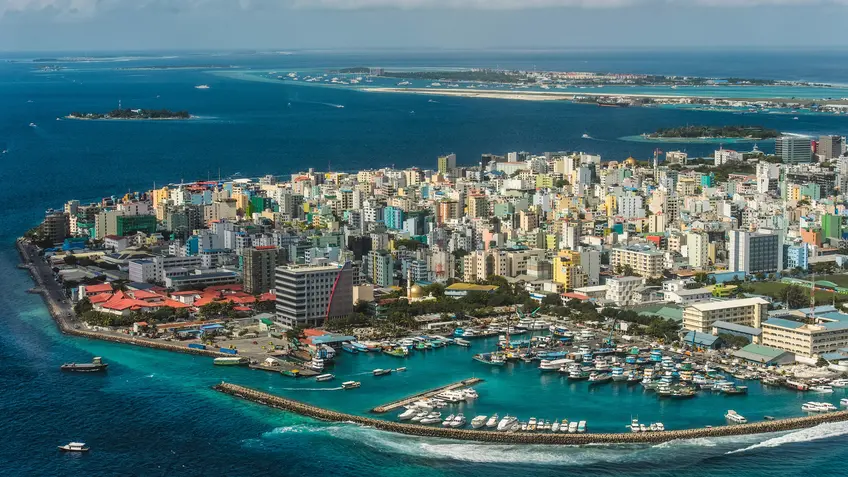Securing the Future: The Maldives’ Push for Climate Investments
Raising Ambition in the Face of Climate Vulnerability
The Maldives is among the world’s most climate-vulnerable countries. As a low-lying island state, it faces severe risks from rising sea levels and extreme weather events. Although it accounts for just 0.004% of global greenhouse gas (GHG) emissions, the Maldives is actively pursuing strategies to cut emissions and transition to low-carbon, climate-resilient development.
The Government of Maldives has recently committed to reducing 1.52 million tonnes of carbon-dioxide equivalent (CO2e) in 2035 — up from 1.1 million tonnes of CO2e in 2020. Yet, access to finance remains a challenge. Fuel imports also account for over 10% of GDP, underscoring the urgency of transitioning to a more cost-effective future built on sustainable energy.
“Our emissions are small, globally speaking, but that does not mean we shouldn't consider mitigation measures. In fact, we must actively boost our climate change mitigation activities,” said Minister of Climate Change, Environment and Energy Thoriq Ibrahim at COP29 last November. His remarks reflect the Maldives’ commitment to climate action, underscoring that Small Island Developing States (SIDS) play a key role in piloting, refining and scaling up climate innovations.
The Maldives’ third Nationally Determined Contribution (NDC), or “NDC 3.0,” developed with coordination and support from the NDC Partnership In-Country Facilitators, embedded within the Ministry of Environment, Climate Change and Environment, now the Ministry of Tourism and Environment, also builds on its 2020 NDC with stronger sectoral adaptation targets.
Integrating Climate Action Across Key Sectors
Situated on fragile coral reefs and heavily reliant on tourism, the Maldives prioritizes marine sustainability. In response to the Maldives’ priorities, the NDC Partnership has supported initiatives that integrate sustainability across key economic sectors, ensuring fisheries remain viable while advancing climate objectives.
Since joining the NDC Partnership in 2016, the Maldives has leveraged support to fast-track implementation of its priority actions. Over the past two years, the NDC Partnership has supported the Ministry of Climate Change, Environment and Energy, the Ministry of Fisheries and Ocean Resources and the Maldives Industrial Fisheries Company to develop a project proposal for the Mitigation Action Facility (MAF) — a multi-donor, grant-based program providing climate finance for mitigation projects. This effort aims to integrate renewable energy solutions into the fisheries sector, reducing reliance on fossil fuels.
In 2023, the Maldives Government submitted a renewable energy project concept note to the MAF, followed by a detailed project outline in 2024 with targeted expertise from an Embedded Advisor deployed by the NDC Partnership. Now in the physical assessment phase, the proposed project includes the installation of 10-megawatt peak (MWp) of solar photovoltaics (PV) at fish processing sites, along with energy efficiency measures, including battery energy storage systems and energy management systems. The project will also involve de-risking low-emission investments in the fisheries sector through an accessible grant facility. Expertise mobilized through the NDC Partnership enabled the Maldives to assess fishery energy use, conduct financial analysis, project emissions reductions and align with MAF funding requirements.
Building Capacity to Unlock Climate Finance
With support from the Partnership Action Fund (PAF), the Maldives is building national capacity to access climate finance and develop investment-ready projects. With PAF funds, the Commonwealth Secretariat, through its Commonwealth Climate Finance Access Hub, is equipping national stakeholders with knowledge, tools and skills to craft bankable adaptation proposals aligned with national climate priorities and long-term resilience goals.
A key outcome of this work is the development of an Adaptation Investment Pipeline that maps priority sectors and packages multiple projects for funding. These efforts are paired with targeted capacity-building workshops, which have played a critical role in strengthening government officials’ ability to craft high-impact proposals that meet the requirements of international funding bodies, including the Adaptation Fund and the Green Climate Fund (GCF). By improving stakeholder coordination and providing critical technical support, the initiative positions the Maldives to unlock climate finance.
“Developing a pipeline of projects has been instrumental in equipping the Maldives to secure financing for transformative climate action,” remarked Sagar Joshi, Commonwealth National Climate Finance Advisor for the Maldives and project co-lead. “By enhancing capacities and fostering collaboration, it paves the way for sustainable development and resilience.”
The Maldives is also participating in the Project Status Checklist pilot program developed by the NDC Partnership Support Unit. The Project Checklist enables capital seekers to standardize project information, strengthening communication between finance seekers, support providers and potential investors. This will support Maldives’ efforts to build a pipeline of potential projects.
“The NDC Partnership has been instrumental in enhancing our capacity to identify and develop impactful climate projects. Through initiatives like PAF and the Project Checklist, we are better equipped to align national priorities in climate finance,” stated Ahmed Waheed, Maldives’ NDC Partnership Country Focal Point.
The NDC Partnership remains committed to supporting the Maldives in unlocking climate finance, deepening coordination and accelerating implementation. Stronger coordination among stakeholders is essential for effective implementation, reinforcing the Maldives’ efforts to achieve its climate targets.
Read more about the Maldives' and other NDC Partnership Member Countries NDC 3.0 submissions here.
